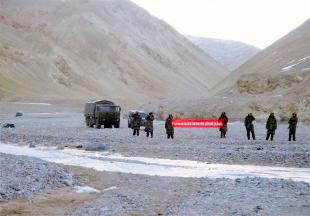 Leh/New Delhi, Aug 5: Amid a spate of incursions by China in Ladakh, its troops are also resorting to tactics like preventing Indian Army from patrolling posts in this sector along the border which was well within India's territory.
Leh/New Delhi, Aug 5: Amid a spate of incursions by China in Ladakh, its troops are also resorting to tactics like preventing Indian Army from patrolling posts in this sector along the border which was well within India's territory.
In what is being described as an aggressive approach by China, the tactics have come to the fore in the wake of yet another incident last week when Indian troops launched its patrol "Tiranga" from Trade Junction area in North of Ladakh for two posts located 14 km up in the higher reaches along the Line of Actual Control(LAC).
The Indian army personnel were stopped by Chinese troops who came mounted on heavy and light vehicles, official sources said today.
The patrol party was shown a banner that it was Chinese territory and that they cannot proceed to the posts, they said.
The sources said the Chinese troops were aggressive in their approach while stopping the Indian patrol who were at their posts.
These posts are well inside Indian territory, the sources said, adding that from April this year, the patrol for these forward bases were launched 21 times and only twice it could complete its mission.
Chinese have erected an observation post which kept a vigil on movement of Indian troops and as soon as an Indian patrol party is ready to leave, they are intercepted midway and sent back, the sources said, adding the matter would be taken up during the next Border Personnel Meeting (BPM) at Chushul.
In the same North Ladakh sector, there were instances when Chinese military vehicles were spotted in Depsang Bulge and Daulat Beg Oldi(DBO) sector where the two armies had seen a 21-day standoff from April 15 this year.
Indian troops comprising mainly Indo-Tibetan Border Police(ITBP) immediately swung into action and prevented the 'free-run' of Chinese military vehicles in the Indian territory.
In the last BPM meeting held on July 27, India also raised objections to a tower being constructed in the Chinese side on the LAC in Demchok-Fukhche sector.
During the meeting with the Chinese side which was led by Colonel Wang Jun Xian, the Indian side said the construction was in violation of Peace and Tranquality Agreement signed between the two countries in 1993.
According to the agreement, no construction work has to be undertaken at the LAC by either country.
The Chinese side claimed that the tower was actually a weather station for the benefit of the people of the area and instead informed the Indian delegation that its Army was engaged in military activities in Fukhche.
The Indian side led by Brigadier Sanjeev Rai told the Chinesse team that PLA troops were regularly entering into the Indian area, sources said.
It gave instances like on July 16 and 19 when the Chinese troops entered 1.2 km deep into Indian territory, on July 17 (2.5 km), on July 20 (aggressive patrol entered 200 metres) and intervening night of July 25-26 (3.5 km).
These incursions mainly happened in Chumar and Demchok areas, located 300 km from Leh.
The sources said that the 'assertive posturing' by the Chinese troops was a worrying trend which had been seen lately after the April 15 faceoff at the DBO sector.
Chumar is the last town after which Himachal Pradesh starts. This area also has the distinction of having a defined International Border with China. This area is not accessible from the Chinese side whereas the Indian side has a road almost to the last point on which the army can carry a load upto nine tonnes.
All Indian units located along the LAC have been asked to maintain a tight vigil in their Area of Responsibilities (AOR) and launch frequent patrols to the higher reaches, the sources said.





Comments
Add new comment